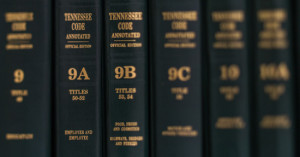Partially at Fault in a Car Wreck in Tennessee?
Partially at Fault in a Car Wreck in Tennessee?
 Law FAQ: I was in a car wreck in Tennessee, and I may be partially at fault. Do I still have a legal claim?
Law FAQ: I was in a car wreck in Tennessee, and I may be partially at fault. Do I still have a legal claim?
ANSWER: Maybe.
You can take comfort in the fact that “slam dunk” cases rarely exist. There are 2 sides to almost every story. Indeed, real life is never quite so neat and tidy. Many car crashes are the result of a number of related factors, circumstances and events on both sides that – when combined together – cause accidents to occur.
For example, someone might have run a red light and pulled out in front of you; however, you might have contributed to the problem by speeding, or not wearing your seat belt, or not paying as close attention to the road as perhaps you should have been. Thus, while you didn’t necessarily cause the wreck, you may be wondering whether your own speed or inattention may have increased the amount of damage or injury caused.
And so the question is: do you still have a legal claim for your car accident or personal injury?
Well, the answer is: it depends. Many people are partially at fault and some of them are still able to recover damages in a car wreck case.
Doctrine of Comparative Fault
Under Tennessee law, a defendant in a car wreck case is entitled to point the finger at another person (or multiple persons), including the plaintiff. In other words, a defendant can ask a jury to assign fault for an accident, either in whole or in part, to someone else. Legally, this is referred to as the “doctrine of comparative fault” – i.e. the jury is asked to literally compare the fault of the parties.
In practice, this means that the jury will listen to all of the competing evidence and then assign a percentage of fault or negligence to each person alleged to have contributed to the accident. The total of the percentages must add up to 100%. The jury is then asked to affix the amount of total damages suffered/incurred.
These fault allocations and damage findings determine whether, and to what extent, a plaintiff is entitled to recover. Specifically, the damages recoverable by the plaintiff are based on the percentage of fault assigned to the defendant.
- Example: If the jury finds that there were total damages of $100, and the defendant is assigned 75% of the fault compared to only 25% fault for the plaintiff, then the plaintiff would recover $75 (75% x $100). The plaintiff wouldn’t be entitled to recover the percentage of damage that he himself caused.
Modified Comparative Fault
Note also that Tennessee follows the doctrine of modified comparative fault. This means that if the plaintiff is found to be 50% at fault for an accident, then he or she is prohibited from recovering any damages at all. So, even if you are partially at fault for an accident, as long as you’re not 50% at fault, you can still recover.
- Example: Using the scenario above involving damages of $100, if the jury were to find the plaintiff and defendant equally at fault (50/50), then the plaintiff would recover $0.
Pure Comparative Fault in Other States
By comparison, some states like Mississippi utilize the doctrine of pure comparative fault, which means that the plaintiff can recover for any fault of the defendant, even a mere 1%.
- Example: Using the scenario above, if the car wreck occurred in Mississippi and the defendant was 1% at fault, then the plaintiff would be able to recover $1, even though the plaintiff was 99% at fault.
Partially at Fault But Think the Other Driver was Responsible?
Each case is unique. It sounds cliche, but it’s the truth. At Patterson Bray, we will look at your case and advise you on the best way to proceed. If you have a question involving a car or trucking accident or a wreck involving serious personal injury, please feel free to call our office at (901) 372-5003 for a FREE consultation.
We Represent Victims of Car Wrecks.
Visit our website to learn more about our work for car accident victims. You can meet our team by clicking here.



 In a car wreck case, or any other case, “negligence” is the legal term for failing to exercise reasonable care and caution under a given set of circumstances. It is commonly referred to as “the ordinary, reasonable person” standard. Legal liability is assessed when a person fails to follow society’s most basic “rules of the road” so to speak.
In a car wreck case, or any other case, “negligence” is the legal term for failing to exercise reasonable care and caution under a given set of circumstances. It is commonly referred to as “the ordinary, reasonable person” standard. Legal liability is assessed when a person fails to follow society’s most basic “rules of the road” so to speak.